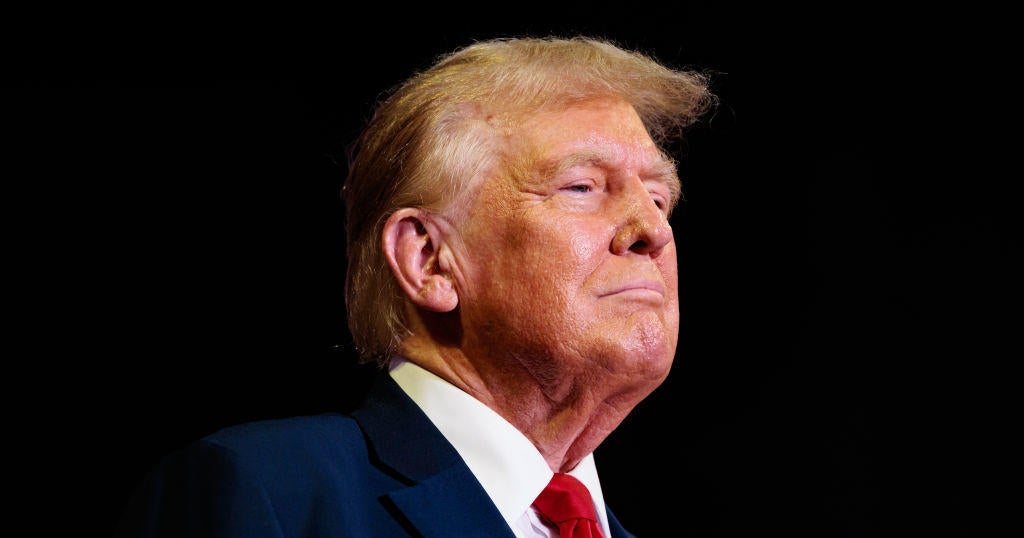CBS News
16 Nobel Prize-winning economists are warning that Trump’s economic plans could reignite inflation

Sixteen of the world’s most notable economists — all Nobel Prize winners — are warning that former President Donald Trump could stoke inflation if he wins the presidency in November and moves forward with his economic plans.
“Many Americans are concerned about inflation, which has come down remarkably fast. There is rightly a worry that Donald Trump will reignite this inflation, with his fiscally irresponsible budgets,” according to a letter signed by the economists, who include Joseph Stiglitz, a Columbia University professor who won the Nobel prize for economics in 2001; and Yale professor Robert Shiller, who won the Nobel prize for economics in 2013.
The warning comes as the U.S. continues to battle sticky inflation, with the Federal Reserve maintaining the highest interest rates in more than two decades with the goal of cooling the economy and driving inflation down to a 2% annual rate. Even though inflation has cooled from a recent peak of 9.1% in June 2022, inflation-weary Americans are glum about the economy, with 6 in 10 rating it as either bad, fairly bad or very bad, according to the latest CBS News poll.
Trump’s policies could prove to be inflationary, other economists also warned, such as his proposal to create a 10% across-the-board tariff on all imports to deporting immigrants. The tariff plan would add $1,700 in annual costs for the typical U.S. household, essentially acting as an inflationary tax, according to experts at the Peterson Institute for International Economics.
Deporting immigrants could shrink the labor force, creating more competition for U.S. workers and pushing up wages, also adding to inflationary pressure, economists warn.
While the letter from Stiglitz and the other 15 Nobel Prize winners didn’t detail the specifics of any part of Trump’s plans, it did single out praise for some of President Joe Biden’s economic policies, ranging from his Inflation Reduction Act to investment in U.S. manufacturing.
“In his first four years as President, Joe Biden signed into law major investments in the U.S. economy, including in infrastructure, domestic manufacturing and climate,” the letter said. “Together, these investments are likely to increase productivity and economic growth while lowering long-term inflationary pressures and facilitating the clean energy transition.”
They added, “While each of us has different views on the particulars of various economic policies, we all agree that Joe Biden’s economic agenda is vastly superior to Donald Trump’s.”
“Top economists, Nobel Prize winners, and business leaders all know America can’t afford Trump’s dangerous economic agenda,” Biden campaign spokesperson, James Singer, told CBS MoneyWatch.
“In Donald Trump’s America, the rich pay less, and working Americans pay more,” he added.
“The American people don’t need worthless out-of-touch Nobel Prize winners to tell them which president put more money in their pockets,” Trump campaign national press secretary Karoline Leavitt said in an emailed statement to CBS MoneyWatch.
If re-elected, Trump plans to implement a “pro-growth, pro-energy, pro-jobs agenda to bring down the cost of living and uplift all Americans,” she added.
“We the undersigned”: Read the letter
You can read the text of the letter below:
We the undersigned are deeply concerned about the risks of a second Trump administration for the U.S. economy.
Among the most important determinants of economic success are the rule of law and economic and political certainty. For a country like the U.S., which is embedded in deep relationships with other countries, conforming to international norms and having normal and stable relationships with other countries is also an imperative. Donald Trump and the vagaries of his actions and policies threaten this stability and the U.S.’s standing in the world.
While each of us has different views on the particulars of various economic policies, we all agree that Joe Biden’s economic agenda is vastly superior to Donald Trump’s. In his first four years as President, Joe Biden signed into law major investments in the U.S. economy, including in infrastructure, domestic manufacturing, and climate. Together, these investments are likely to increase productivity and economic growth while lowering long-term inflationary pressures and facilitating the clean energy transition.
During Joe Biden’s presidency we have also seen a remarkably strong and equitable labor market recovery — enabled by his pandemic stimulus. An additional four years of Joe Biden’s presidency would allow him to continue supporting an inclusive U.S. economic recovery.
Many Americans are concerned about inflation, which has come down remarkably fast. There is rightly a worry that Donald Trump will reignite this inflation, with his fiscally irresponsible budgets. Nonpartisan researchers, including at Evercore, Allianz, Oxford Economics, and the Peterson Institute, predict that if Donald Trump successfully enacts his agenda, it will increase inflation.
The outcome of this election will have economic repercussions for years, and possibly decades, to come. We believe that a second Trump term would have a negative impact on the U.S.’s economic standing in the world and a destabilizing effect on the U.S.’s domestic economy.
Signed,
George A. Akerlof (2001)
Sir Angus Deaton (2015)
Claudia Goldin (2023)
Sir Oliver Hart (2016)
Eric S. Maskin (2007)
Daniel L. McFadden (2000)
Paul R. Milgrom (2020)
Roger B. Myerson (2007)
Edmund S. Phelps (2006)
Paul M. Romer (2018)
Alvin E. Roth (2012)
William F. Sharpe (1990)
Robert J. Shiller (2013)
Christopher A. Sims (2011)
Joseph E. Stiglitz (2001)
Robert B. Wilson (2020)
CBS News
Page Not Found: 404 Not Found
The page cannot be found
The page may have been removed, had its name changed, or is just temporarily unavailable.
Be the first to know
Get browser notifications for breaking news, live events, and exclusive reporting.
CBS News
Details on bill to avert government shutdown

Watch CBS News
Be the first to know
Get browser notifications for breaking news, live events, and exclusive reporting.
CBS News
Explosion kills 2 Mexican soldiers in suspected booby trap by drug cartel after troops found dismembered bodies

An improvised land mine apparently planted by a drug cartel killed two Mexican soldiers and wounded five others, Mexico’s defense secretary said Tuesday. Before the blast, the soldiers had discovered the dismembered bodies of three people, officials said.
Gen. Ricardo Trevilla acknowledged that the army had already suffered six deaths from such improvised explosive devices, or IEDs, between 2018 and 2024. But he didn’t specify whether those six had been killed by bombs dropped from drones, or by buried roadside bombs, both of which have been used by gangs in Mexico.
Trevilla said that devices like the one that exploded Monday were “very rustic,” and officials in the past have described them as similar to buried pipe bombs. There was no immediate information on the condition of the five wounded in the attack, which included at least one officer.
Trevilla’s description of the location where the two soldiers died Monday in the western state of Michoacan suggested that it may have been a sort of grisly drug cartel booby trap.
Trevilla said the army sent out a patrol to check on reports that there was an encampment of armed men in a rural area. The armed forces detected an area protected by stockades that appeared to be an encampment, but when soldiers approached in vehicles, they found the trail blocked by logs, so they descended and had to approach on foot.
While approaching, they spotted three dismembered bodies near the encampment, which appeared to be abandoned. But as they drew closer, a buried device exploded and struck the soldiers.
Trevilla blamed the blast on the United Cartels, an umbrella group that includes the local Viagras gang, which has been fighting bloody turf battles against the Jalisco cartel in Michoacan for years.
In August, the Mexican army acknowledged that some of its soldiers have been killed by bomb-dropping drones operated by drug cartels.
Previously, officials have said the army encounters far more roadside bombs than drone-dropped ones.
The Jalisco drug cartel has been fighting local gangs for control of Michoacan for years, and the situation has become so militarized that the warring cartels use roadside bombs or IEDs, trenches, pillbox fortifications, homemade armored vehicles and sniper rifles.
Nemesio Oseguera-Cervantes, also known as “El Mencho,” the leader of the Jalisco cartel, which the officials described as “one of the world’s most violent and prolific drug trafficking organizations.” The United States and the State Department has offered a $10 million reward for his capture.
In the only previous detailed report on cartel bomb attacks in August 2023, the defense department said at that time that a total of 42 soldiers, police and suspects were wounded by IEDs in the first seven and a half months of 2023, up from 16 in all of 2022.
Overall, 556 improvised explosive devices of all types – roadside, drone-carried and car bombs – were found in 2023, the army said in a news release last year.







